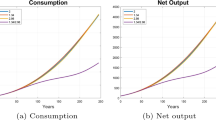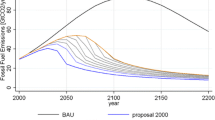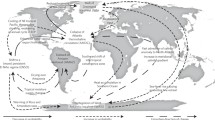Abstract
This paper examines the consequences of various attitudes towards climate damages through a family of stochastic optimal control models (RESPONSE): cost-efficiency for a given temperature ceiling; cost-benefit analysis with a “pure preference for current climate regime” and full cost-benefit analysis. The choice of a given proxy of climate change risks is actually more than a technical option. It is essentially motivated by the degree of distrust regarding the legitimacy of an assessment of climate damages and the possibility of providing in due time reliable and non controversial estimates. Our results demonstrate that (a) for early decades abatement, the difference between various decision-making frameworks appears to matter less than the difference between stochastic and non stochastic approach given the cascade of uncertainty from emissions to damages; (b) in a stochastic approach, the possibility of non-catastrophic singularities in the damage function is sufficient to significantly increase earlier optimal abatements; (c) a window of opportunity for action exists up to 2040: abatements further delayed may induce significant regret in case of bad news about climate response or singularities in damages.
Similar content being viewed by others
References
United Nations Framework Convention on Climate Change (1992).
J.J.McCarthy et al., eds., Climate Change 2001: Impacts, Adaptation and Vulnerability. Contribution of Working Group II to the Third Assessment Report of the Intergovernmental Panel on Climate Change (Cambridge University Press, Cambridge, UK & US, 2001).
J.P. Bruce, H. Lee and E.F. Haites, eds., Climate Change 1995: Economic and Social Dimensions of Climate Change. Contribution of Working Group III to the Second Assessment Report of the Intergovernmental Panel on Climate Change (Cambridge University Press, Cambridge, UK & US, 1996).
B. Metz et al., eds., Climate Change 2001: Mitigation. Contribution of Working Group III to the Third Assessment Report of the Intergovernmental Panel on Climate Change (Cambridge University Press, Cambridge, UK & US, 2001).
L.B. Lave, Formulating greenhouse policies in a sea of uncertainties, Energy Journal 12(1) (1992) 9–21.
R. Costanza et al., The value of the world's ecosystem services and natural capital, Nature 387 (1997) 253–260.
M.A. Toman, Why not to calculate the value of the world's ecosystem services and natural capital, Ecological Economics 25(1) (1998) 57–60.
J.K. Hammitt, Evaluation endpoints and climate policy: atmospheric stabilisation, benefit-cost analysis and near-term green-house gas emissions, Climatic Change 41 (1999) 447–468.
M. Ha Duong, M. Grubb and J.C. Hourcade, Influence of socioeconomic inertia and uncertainty on optimal CO2-emission abatement, Nature 390 (1997) 270–274.
T.M.L. Wigley, R. Richels and J.A. Edmonds, Economic and environmental choices in the stabilization of atmospheric CO2 concentrations, Nature 379 (1996) 240–243.
J.T. Houghton et al., eds., Climate Change 2001: the Scientific Basis. Contribution of Working Group I to the Third Assessment Report of the Intergovernmental Panel on Climate Change (Cambridge University Press, Cambridge, UK & US, 2001).
W. Nordhaus and R. Boyer, Warming the World: Economics Models of Climate Change (MIT Press, Cambridge, MA, USA, 1999).
M. Parry et al., Millions at risk: defining critical climate change threats and targets, Global Environmental Change 11 (2001) 181–183.
O. Simonett, Potential impacts of global warming: cases studies on climatic change, GRID-Geneva, Geneva, Switzerland (1989).
EU, Communication on Community strategy on climate change: Council conclusions, Brussels (1996).
A.S. Manne and R. Richels, Buying Greenhouse Insurance: The Economic Cost of CO 2 Emissions Limits (MIT Press, Cambridge, MA, USA, 1992).
Ph. Ambrosi, J.C. Hourcade and H. Le Treut, Incertitudes sur la sensibilité du climat: valeur de l'information et politique climatique optimale, in: Modélisation intégrée, évaluation des risques climatiques et des politiques de précaution, eds. J.C. Hourcade and H. Le Treut, Progamme GICC (Mate/MIES/Ademe), Rapport final (2002).
J.C. Hourcade and T. Chapuis, No-regret potentials and technical innovation, Energy Policy 23(4/5) (1995) 433–445.
G. Scimeni, Environmental strategies and anticipatory strategies, in: Preventive Environemental Policy, ed. C.E. Simonis (Campus, NY, USA, 1987).
A.S. Manne, Hedging strategies for global carbon dioxide abatement: a summary of poll results, EMF-14 Sub group-Analysis for decision under uncertainty, Stanford University, Stanford, CA (1995).
W.R. Cline, La lutte contre l'effet de serre, Finance et développement 30(1) (1996) 4–6.
T.C. Koopmans, Stationary ordinal utility and impatience, Econometrica 28(2) (1960) 287–309.
G. Chichilnisky, An axiomatic approach to sustainable development, Social Choice and Welfare 13(2) (1996) 231–257.
F. Lecocq and J.C. Hourcade, Incertitude, irréversibilités et actualisation dans les calculs économiques sur l'effet de serre, in: Les enjeux économiques de l'effet de serre, ed. R. Guesnerie (La Documentation Française, Paris, 2003) pp. 177–199.
A.K. Dixit and R.S. Pyndick, The Timing of Environmental Policy (Princeton University Press, Princeton, NJ, USA, 1994).
U. Narain and A.C. Fisher, Global Warming, Endogenous Risk and Irreversibility (Department of Agricultural and Resource Economics-UC Berkeley, CA, USA, 2002).
Gjerde, J., S. Grepperud and S. Kverndokk, Optimal climate policy under the possibility of a catastrophe, Resources and Energy Economics 21 (1999) 289–317.
W. Nordhaus, Managing the Global Commons: the Economics of Climate Change (MIT Press, Cambridge, MA, USA, 1994).
R. Alley, ed., Abrupt Climate Change: Inevitable Surprises (National Academy Press, Washington, DC, 2002).
H. Weiss and R.S. Bradley, What drives societal collapse?, Science (2001) 609–610.
P. Dumas and M. Ha Duong, Non-linearities and uncertain climate impacts, in: Energy Modeling Forum (EMF), Laxenburg, Austria (2001).
S. Peck and T. Teisberg, The importance of nonlinearities in global warming damage costs, in: Assessing Surprises and Nonlinearities in Greenhouse Warming (RFF, Washington, DC, 1993).
N. Nakicenovic, ed., Special Report on Emissions Scenarios: a Special Report of Working Group III of the Intergovernmental Panel on Climate Change (Cambridge University Press, UK & US, 2000).
S.H. Schneider and S.L. Thompson, Atmospheric CO2 and climate: importance of the transient response, Journal of Geophysical Research 86 (1981) 3135–3147.
Author information
Authors and Affiliations
Corresponding author
Rights and permissions
About this article
Cite this article
Ambrosi, P., Hourcade, JC., Hallegatte, S. et al. Optimal Control Models and Elicitation of Attitudes towards Climate Damages. Environmental Modeling & Assessment 8, 133–147 (2003). https://doi.org/10.1023/A:1025586922143
Issue Date:
DOI: https://doi.org/10.1023/A:1025586922143




